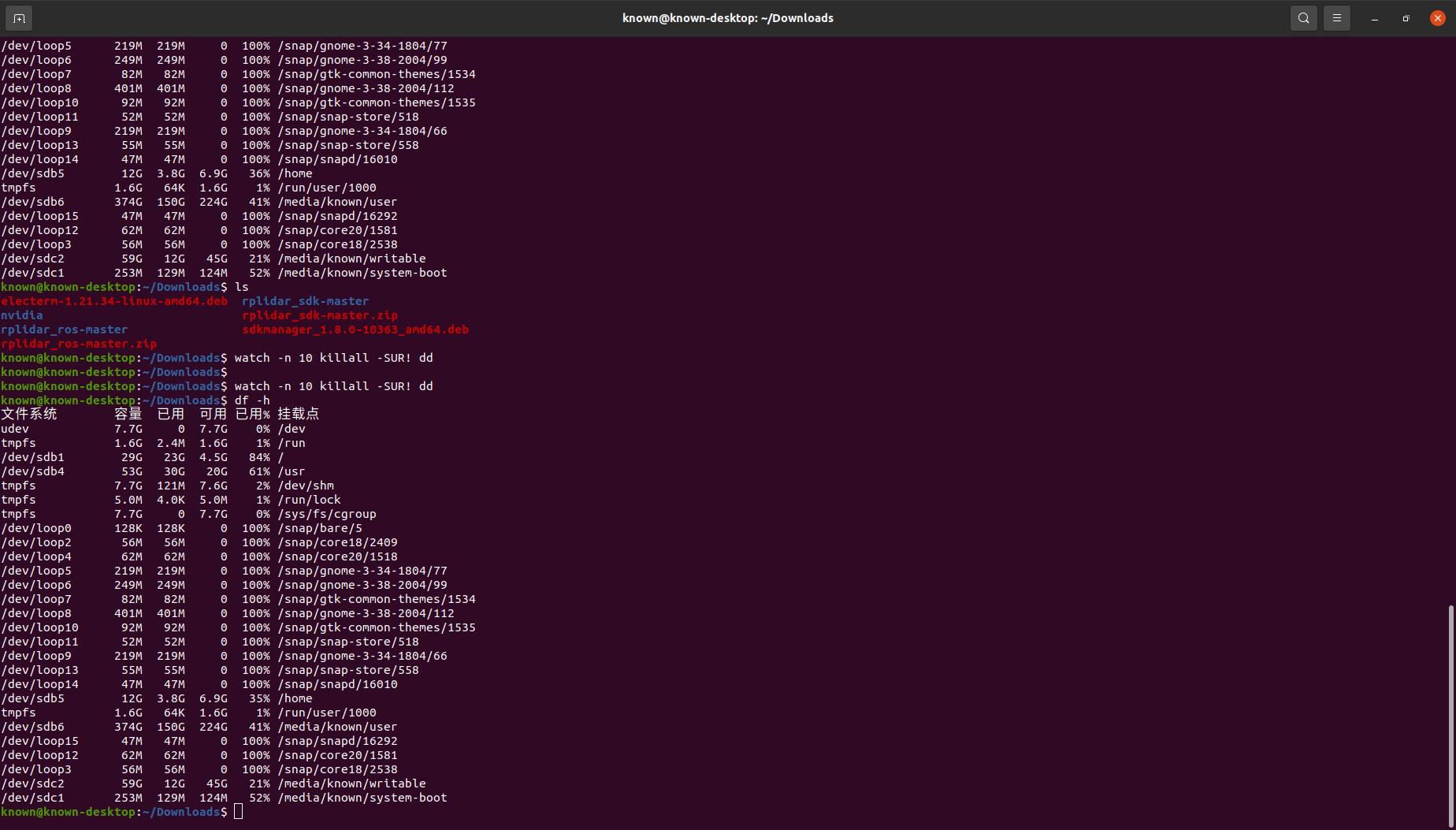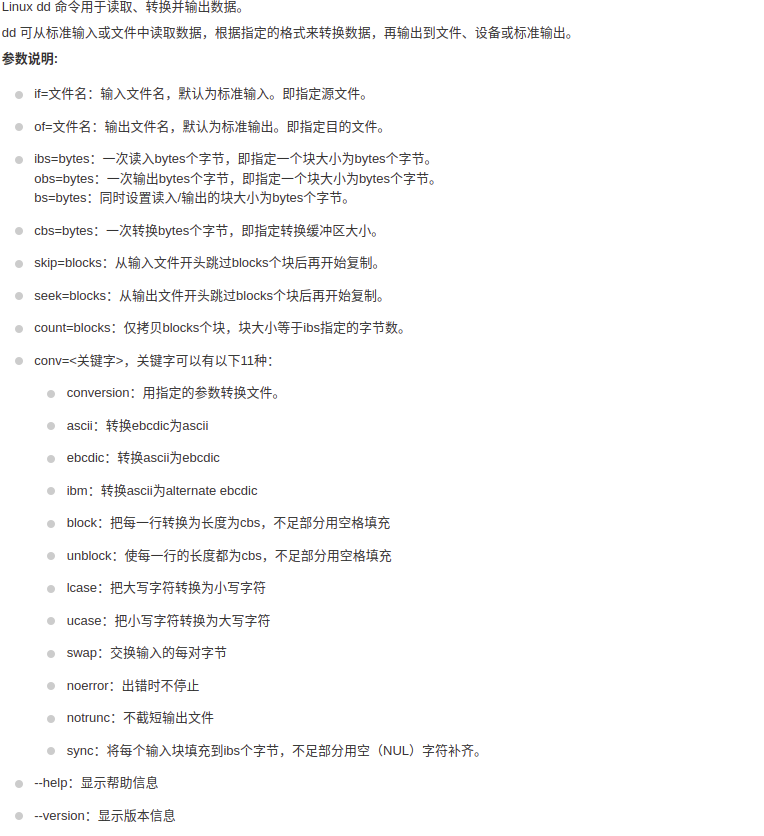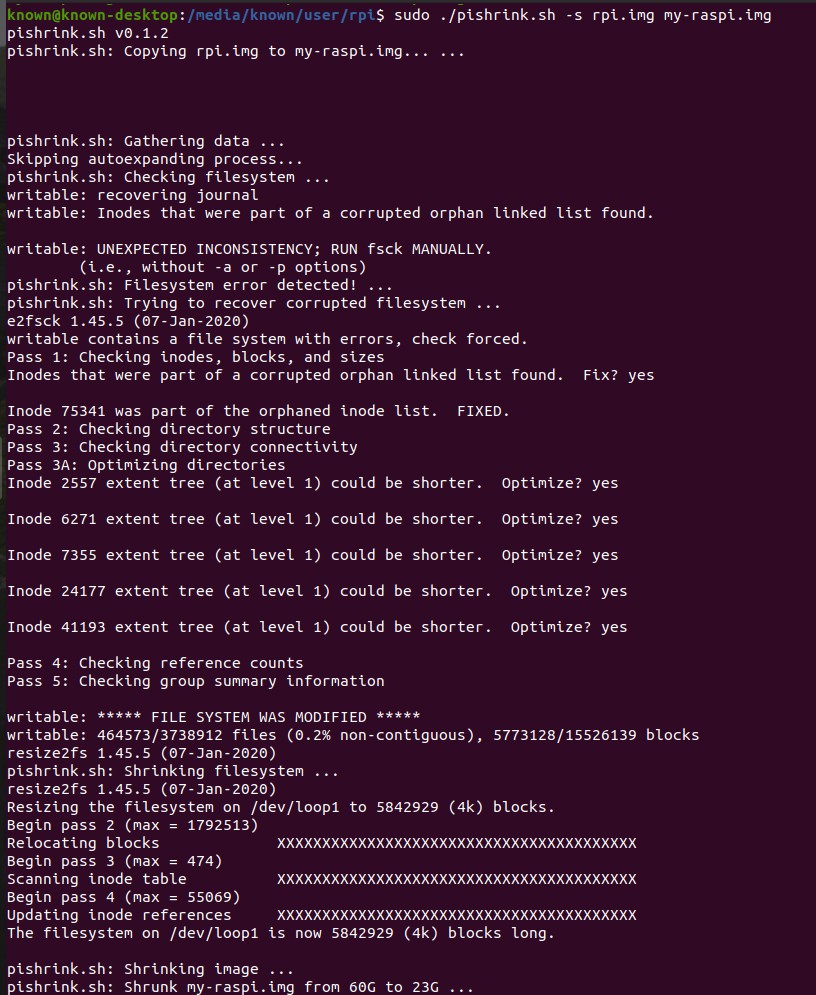制作 .Img 镜像文件
将设备文件中(SD 卡/TF卡)中的内容读出,使用 dd 命令制作成.Img镜像文件,并使用 PiShrink.sh 对拷贝文件瘦身。
文章目录
1. 准备工作
一台 Linux 内核的电脑
2. 使用 dd 命令制作镜像
2.1 查找设备文件
在终端输入df -h或lsblk命令,查找设备文件

图中,sdc1、sdc2即为我的SD 卡设备文件
2.2 使用dd命令将设备制作成镜像文件

PS:本步骤前请确保磁盘空间足够,确保能够存放你的设备文件
# 以下命令将sdc压缩到/home目录的rpi.img文件中
dd if=/dev/sdc of=/home/rpi.img bs=8M
PS:制作.img需要点时间,请耐心等待
可能需要用户权限,可在开始使用
su命令进入root模式,或者在此语句前加sudo命令。
查看dd命令进度
在另一终端使用watch -n 5 pkill -USR1 -x dd命令,每隔5s输出一次进度。
sudo watch -n 5 pkill -USR1 -x dd
若不需要瘦身的话,到这一步就已经制作完成!
接下来,只需要和最初下载数莓派镜像文件一样操作就好了。例如直接用Win32DiskImager工具,在此就不再赘述
3. 使用 PiShrink.sh 脚本文件瘦身
这里可以理解为dd命令是将设备文件整盘克隆了下来(包括分区中未用到的空间),我们使用PiShrink将.img文件进行瘦身处理。
3.1 PiShrink.sh 脚本文件下载
git clone https://github.com/Drewsif/PiShrink.git
若不方便,可以直接复制附录里的源码
3.2 执行PiShrink.sh
# 修改PiShrink.sh文件权限,使之变为可执行文件
sudo chmod 755 pishrink.sh
# 执行脚本进行压缩,其中rpi.img为dd命令生成的img文件,my-raspi.img为用Shell脚本生成的新.img文件
sudo ./pishrink.sh -s rpi.img my-raspi.img

PS:该步骤需要稍加等待,如图所示60G的源.img文件(dd命令制作)被该脚本“压缩”为了23G,我们将23G的镜像文件拷贝出来,使用Win32DiskImager工具便可向新的TF/SD卡中烧录制作的镜像。烧录完后不要忘记给分区进行扩容(原TF卡中未使用到的空间被PiShrink"压缩"掉了)
4. 拓展文件系统
然后启动系统, 可以进入系统, 也有可能没法登录, 按ctrl+alt+F1进入终端模式, 执行startx 可以发现报错为无法写入文件,使用df -h会发现根目录可用空间为0, 接下来需要扩展文件系统才能使用。
还原后根目录/空间比较小,需要扩展分区大小
最简单的方法: 直接启动树莓派,这个时候可能图形界面无法加载, 按ctrl+alt+F1进入终端模式, 执行
sudo raspi-config
在advanced config中选择expand filesystem, 然后reboot就好了。
另外,也可以使用linux下的图形工具gparted,或者直接用命令行工具resize2fs。
5. 附录
源码
#!/bin/bash
version="v0.1.2"
CURRENT_DIR="$(pwd)"
SCRIPTNAME="${0##*/}"
MYNAME="${SCRIPTNAME%.*}"
LOGFILE="${CURRENT_DIR}/${SCRIPTNAME%.*}.log"
REQUIRED_TOOLS="parted losetup tune2fs md5sum e2fsck resize2fs"
ZIPTOOLS=("gzip xz")
declare -A ZIP_PARALLEL_TOOL=( [gzip]="pigz" [xz]="xz" ) # parallel zip tool to use in parallel mode
declare -A ZIP_PARALLEL_OPTIONS=( [gzip]="-f9" [xz]="-T0" ) # options for zip tools in parallel mode
declare -A ZIPEXTENSIONS=( [gzip]="gz" [xz]="xz" ) # extensions of zipped files
function info() {
echo "$SCRIPTNAME: $1 ..."
}
function error() {
echo -n "$SCRIPTNAME: ERROR occured in line $1: "
shift
echo "$@"
}
function cleanup() {
if losetup "$loopback" &>/dev/null; then
losetup -d "$loopback"
fi
if [ "$debug" = true ]; then
local old_owner=$(stat -c %u:%g "$src")
chown "$old_owner" "$LOGFILE"
fi
}
function logVariables() {
if [ "$debug" = true ]; then
echo "Line $1" >> "$LOGFILE"
shift
local v var
for var in "$@"; do
eval "v=\$$var"
echo "$var: $v" >> "$LOGFILE"
done
fi
}
function checkFilesystem() {
info "Checking filesystem"
e2fsck -pf "$loopback"
(( $? < 4 )) && return
info "Filesystem error detected!"
info "Trying to recover corrupted filesystem"
e2fsck -y "$loopback"
(( $? < 4 )) && return
if [[ $repair == true ]]; then
info "Trying to recover corrupted filesystem - Phase 2"
e2fsck -fy -b 32768 "$loopback"
(( $? < 4 )) && return
fi
error $LINENO "Filesystem recoveries failed. Giving up..."
exit 9
}
function set_autoexpand() {
#Make pi expand rootfs on next boot
mountdir=$(mktemp -d)
partprobe "$loopback"
mount "$loopback" "$mountdir"
if [ ! -d "$mountdir/etc" ]; then
info "/etc not found, autoexpand will not be enabled"
umount "$mountdir"
return
fi
if [[ -f "$mountdir/etc/rc.local" ]] && [[ "$(md5sum "$mountdir/etc/rc.local" | cut -d ' ' -f 1)" != "1c579c7d5b4292fd948399b6ece39009" ]]; then
echo "Creating new /etc/rc.local"
if [ -f "$mountdir/etc/rc.local" ]; then
mv "$mountdir/etc/rc.local" "$mountdir/etc/rc.local.bak"
fi
#####Do not touch the following lines#####
cat <<\EOF1 > "$mountdir/etc/rc.local"
#!/bin/bash
do_expand_rootfs() {
ROOT_PART=$(mount | sed -n 's|^/dev/\(.*\) on / .*|\1|p')
PART_NUM=${ROOT_PART#mmcblk0p}
if [ "$PART_NUM" = "$ROOT_PART" ]; then
echo "$ROOT_PART is not an SD card. Don't know how to expand"
return 0
fi
# Get the starting offset of the root partition
PART_START=$(parted /dev/mmcblk0 -ms unit s p | grep "^${PART_NUM}" | cut -f 2 -d: | sed 's/[^0-9]//g')
[ "$PART_START" ] || return 1
# Return value will likely be error for fdisk as it fails to reload the
# partition table because the root fs is mounted
fdisk /dev/mmcblk0 <<EOF
p
d
$PART_NUM
n
p
$PART_NUM
$PART_START
p
w
EOF
cat <<EOF > /etc/rc.local &&
#!/bin/sh
echo "Expanding /dev/$ROOT_PART"
resize2fs /dev/$ROOT_PART
rm -f /etc/rc.local; cp -f /etc/rc.local.bak /etc/rc.local; /etc/rc.local
EOF
reboot
exit
}
raspi_config_expand() {
/usr/bin/env raspi-config --expand-rootfs
if [[ $? != 0 ]]; then
return -1
else
rm -f /etc/rc.local; cp -f /etc/rc.local.bak /etc/rc.local; /etc/rc.local
reboot
exit
fi
}
raspi_config_expand
echo "WARNING: Using backup expand..."
sleep 5
do_expand_rootfs
echo "ERROR: Expanding failed..."
sleep 5
if [[ -f /etc/rc.local.bak ]]; then
cp -f /etc/rc.local.bak /etc/rc.local
/etc/rc.local
fi
exit 0
EOF1
#####End no touch zone#####
chmod +x "$mountdir/etc/rc.local"
fi
umount "$mountdir"
}
help() {
local help
read -r -d '' help << EOM
Usage: $0 [-adhrspvzZ] imagefile.img [newimagefile.img]
-s Don't expand filesystem when image is booted the first time
-v Be verbose
-r Use advanced filesystem repair option if the normal one fails
-z Compress image after shrinking with gzip
-Z Compress image after shrinking with xz
-a Compress image in parallel using multiple cores
-p Remove logs, apt archives, dhcp leases and ssh hostkeys
-d Write debug messages in a debug log file
EOM
echo "$help"
exit 1
}
should_skip_autoexpand=false
debug=false
repair=false
parallel=false
verbose=false
prep=false
ziptool=""
while getopts ":adhprsvzZ" opt; do
case "${opt}" in
a) parallel=true;;
d) debug=true;;
h) help;;
p) prep=true;;
r) repair=true;;
s) should_skip_autoexpand=true ;;
v) verbose=true;;
z) ziptool="gzip";;
Z) ziptool="xz";;
*) help;;
esac
done
shift $((OPTIND-1))
if [ "$debug" = true ]; then
info "Creating log file $LOGFILE"
rm "$LOGFILE" &>/dev/null
exec 1> >(stdbuf -i0 -o0 -e0 tee -a "$LOGFILE" >&1)
exec 2> >(stdbuf -i0 -o0 -e0 tee -a "$LOGFILE" >&2)
fi
echo "${0##*/} $version"
#Args
src="$1"
img="$1"
#Usage checks
if [[ -z "$img" ]]; then
help
fi
if [[ ! -f "$img" ]]; then
error $LINENO "$img is not a file..."
exit 2
fi
if (( EUID != 0 )); then
error $LINENO "You need to be running as root."
exit 3
fi
# check selected compression tool is supported and installed
if [[ -n $ziptool ]]; then
if [[ ! " ${ZIPTOOLS[@]} " =~ $ziptool ]]; then
error $LINENO "$ziptool is an unsupported ziptool."
exit 17
else
if [[ $parallel == true && $ziptool == "gzip" ]]; then
REQUIRED_TOOLS="$REQUIRED_TOOLS pigz"
else
REQUIRED_TOOLS="$REQUIRED_TOOLS $ziptool"
fi
fi
fi
#Check that what we need is installed
for command in $REQUIRED_TOOLS; do
command -v $command >/dev/null 2>&1
if (( $? != 0 )); then
error $LINENO "$command is not installed."
exit 4
fi
done
#Copy to new file if requested
if [ -n "$2" ]; then
f="$2"
if [[ -n $ziptool && "${f##*.}" == "${ZIPEXTENSIONS[$ziptool]}" ]]; then # remove zip extension if zip requested because zip tool will complain about extension
f="${f%.*}"
fi
info "Copying $1 to $f..."
cp --reflink=auto --sparse=always "$1" "$f"
if (( $? != 0 )); then
error $LINENO "Could not copy file..."
exit 5
fi
old_owner=$(stat -c %u:%g "$1")
chown "$old_owner" "$f"
img="$f"
fi
# cleanup at script exit
trap cleanup EXIT
#Gather info
info "Gathering data"
beforesize="$(ls -lh "$img" | cut -d ' ' -f 5)"
parted_output="$(parted -ms "$img" unit B print)"
rc=$?
if (( $rc )); then
error $LINENO "parted failed with rc $rc"
info "Possibly invalid image. Run 'parted $img unit B print' manually to investigate"
exit 6
fi
partnum="$(echo "$parted_output" | tail -n 1 | cut -d ':' -f 1)"
partstart="$(echo "$parted_output" | tail -n 1 | cut -d ':' -f 2 | tr -d 'B')"
if [ -z "$(parted -s "$img" unit B print | grep "$partstart" | grep logical)" ]; then
parttype="primary"
else
parttype="logical"
fi
loopback="$(losetup -f --show -o "$partstart" "$img")"
tune2fs_output="$(tune2fs -l "$loopback")"
rc=$?
if (( $rc )); then
echo "$tune2fs_output"
error $LINENO "tune2fs failed. Unable to shrink this type of image"
exit 7
fi
currentsize="$(echo "$tune2fs_output" | grep '^Block count:' | tr -d ' ' | cut -d ':' -f 2)"
blocksize="$(echo "$tune2fs_output" | grep '^Block size:' | tr -d ' ' | cut -d ':' -f 2)"
logVariables $LINENO beforesize parted_output partnum partstart parttype tune2fs_output currentsize blocksize
#Check if we should make pi expand rootfs on next boot
if [ "$parttype" == "logical" ]; then
echo "WARNING: PiShrink does not yet support autoexpanding of this type of image"
elif [ "$should_skip_autoexpand" = false ]; then
set_autoexpand
else
echo "Skipping autoexpanding process..."
fi
if [[ $prep == true ]]; then
info "Syspreping: Removing logs, apt archives, dhcp leases and ssh hostkeys"
mountdir=$(mktemp -d)
mount "$loopback" "$mountdir"
rm -rvf $mountdir/var/cache/apt/archives/* $mountdir/var/lib/dhcpcd5/* $mountdir/var/log/* $mountdir/var/tmp/* $mountdir/tmp/* $mountdir/etc/ssh/*_host_*
umount "$mountdir"
fi
#Make sure filesystem is ok
checkFilesystem
if ! minsize=$(resize2fs -P "$loopback"); then
rc=$?
error $LINENO "resize2fs failed with rc $rc"
exit 10
fi
minsize=$(cut -d ':' -f 2 <<< "$minsize" | tr -d ' ')
logVariables $LINENO currentsize minsize
if [[ $currentsize -eq $minsize ]]; then
error $LINENO "Image already shrunk to smallest size"
exit 11
fi
#Add some free space to the end of the filesystem
extra_space=$(($currentsize - $minsize))
logVariables $LINENO extra_space
for space in 5000 1000 100; do
if [[ $extra_space -gt $space ]]; then
minsize=$(($minsize + $space))
break
fi
done
logVariables $LINENO minsize
#Shrink filesystem
info "Shrinking filesystem"
resize2fs -p "$loopback" $minsize
rc=$?
if (( $rc )); then
error $LINENO "resize2fs failed with rc $rc"
mount "$loopback" "$mountdir"
mv "$mountdir/etc/rc.local.bak" "$mountdir/etc/rc.local"
umount "$mountdir"
losetup -d "$loopback"
exit 12
fi
sleep 1
#Shrink partition
partnewsize=$(($minsize * $blocksize))
newpartend=$(($partstart + $partnewsize))
logVariables $LINENO partnewsize newpartend
parted -s -a minimal "$img" rm "$partnum"
rc=$?
if (( $rc )); then
error $LINENO "parted failed with rc $rc"
exit 13
fi
parted -s "$img" unit B mkpart "$parttype" "$partstart" "$newpartend"
rc=$?
if (( $rc )); then
error $LINENO "parted failed with rc $rc"
exit 14
fi
#Truncate the file
info "Shrinking image"
endresult=$(parted -ms "$img" unit B print free)
rc=$?
if (( $rc )); then
error $LINENO "parted failed with rc $rc"
exit 15
fi
endresult=$(tail -1 <<< "$endresult" | cut -d ':' -f 2 | tr -d 'B')
logVariables $LINENO endresult
truncate -s "$endresult" "$img"
rc=$?
if (( $rc )); then
error $LINENO "trunate failed with rc $rc"
exit 16
fi
# handle compression
if [[ -n $ziptool ]]; then
options=""
envVarname="${MYNAME^^}_${ziptool^^}" # PISHRINK_GZIP or PISHRINK_XZ environment variables allow to override all options for gzip or xz
[[ $parallel == true ]] && options="${ZIP_PARALLEL_OPTIONS[$ziptool]}"
[[ -v $envVarname ]] && options="${!envVarname}" # if environment variable defined use these options
[[ $verbose == true ]] && options="$options -v" # add verbose flag if requested
if [[ $parallel == true ]]; then
parallel_tool="${ZIP_PARALLEL_TOOL[$ziptool]}"
info "Using $parallel_tool on the shrunk image"
if ! $parallel_tool ${options} "$img"; then
rc=$?
error $LINENO "$parallel_tool failed with rc $rc"
exit 18
fi
else # sequential
info "Using $ziptool on the shrunk image"
if ! $ziptool ${options} "$img"; then
rc=$?
error $LINENO "$ziptool failed with rc $rc"
exit 19
fi
fi
img=$img.${ZIPEXTENSIONS[$ziptool]}
fi
aftersize=$(ls -lh "$img" | cut -d ' ' -f 5)
logVariables $LINENO aftersize
info "Shrunk $img from $beforesize to $aftersize"
更多推荐
 已为社区贡献5条内容
已为社区贡献5条内容









所有评论(0)